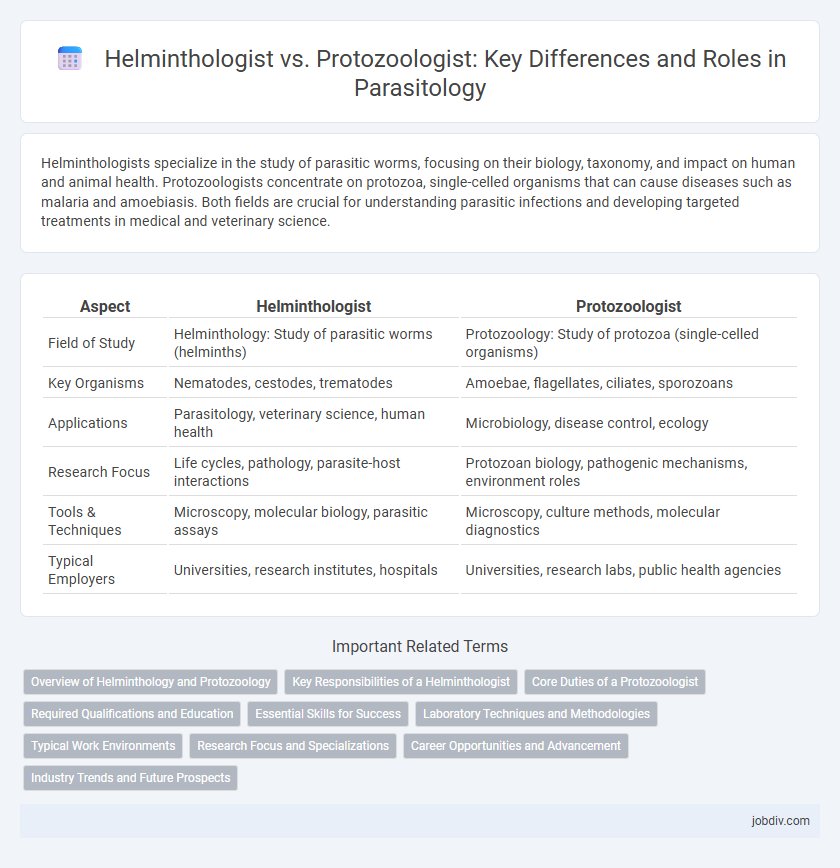Helminthologists specialize in the study of parasitic worms, focusing on their biology, taxonomy, and impact on human and animal health. Protozoologists concentrate on protozoa, single-celled organisms that can cause diseases such as malaria and amoebiasis. Both fields are crucial for understanding parasitic infections and developing targeted treatments in medical and veterinary science.
Table of Comparison
| Aspect | Helminthologist | Protozoologist |
|---|---|---|
| Field of Study | Helminthology: Study of parasitic worms (helminths) | Protozoology: Study of protozoa (single-celled organisms) |
| Key Organisms | Nematodes, cestodes, trematodes | Amoebae, flagellates, ciliates, sporozoans |
| Applications | Parasitology, veterinary science, human health | Microbiology, disease control, ecology |
| Research Focus | Life cycles, pathology, parasite-host interactions | Protozoan biology, pathogenic mechanisms, environment roles |
| Tools & Techniques | Microscopy, molecular biology, parasitic assays | Microscopy, culture methods, molecular diagnostics |
| Typical Employers | Universities, research institutes, hospitals | Universities, research labs, public health agencies |
Overview of Helminthology and Protozoology
Helminthology studies parasitic worms such as nematodes, cestodes, and trematodes that impact human, animal, and plant health, focusing on their biology, life cycles, and control methods. Protozoology examines protozoa, unicellular eukaryotic organisms like amoebas and ciliates, emphasizing their taxonomy, physiology, and role as pathogens in diseases such as malaria and amoebiasis. Both disciplines contribute crucial knowledge for diagnosing, treating, and preventing parasitic infections with significant public health and veterinary implications.
Key Responsibilities of a Helminthologist
Helminthologists specialize in the study of parasitic worms, focusing on their identification, life cycles, and impact on hosts, which distinguishes their work from protozoologists who study protozoa. Key responsibilities include conducting field research to collect helminth specimens, analyzing host-parasite interactions, and developing methods for parasite control and treatment. Their expertise is crucial in combating diseases caused by helminths, contributing to advancements in veterinary and human medicine.
Core Duties of a Protozoologist
Protozoologists specialize in studying protozoa, focusing on their biology, ecology, and role in disease transmission. They isolate and identify protozoan species, analyze their life cycles, and investigate pathogenic mechanisms affecting humans and animals. Their research supports advancements in medical parasitology, epidemiology, and environmental microbiology.
Required Qualifications and Education
Helminthologists typically require a bachelor's degree in biology or zoology, with advanced studies focusing on parasitology and helminth taxonomy, often culminating in a master's or PhD for research positions. Protozoologists need a similar educational background, emphasizing microbiology and protozoan biology, with graduate-level specialization essential for laboratory research or academic roles. Both fields demand strong foundations in molecular biology, ecology, and pathology to effectively study parasitic worms and protozoa respectively.
Essential Skills for Success
Helminthologists require expertise in parasitology, microscopy, and molecular biology techniques to study parasitic worms, emphasizing skills like taxonomic identification and life cycle analysis. Protozoologists must excel in cell culture, microscopy, and biochemical assays to investigate protozoan pathogens, focusing on skills related to pathogen-host interactions and disease mechanisms. Both fields demand strong analytical skills, proficiency in laboratory methodologies, and a deep understanding of organism biology to advance research and contribute to disease control.
Laboratory Techniques and Methodologies
Helminthologists specialize in identifying parasitic worms using techniques such as microscopic examination of fecal samples, sedimentation, and flotation methods to detect helminth eggs and larvae. Protozoologists utilize staining methods like Giemsa and fluorescence microscopy to observe protozoan morphology and life cycles, employing culture techniques for species isolation and molecular assays like PCR for precise identification. Both disciplines rely heavily on microscopy but differ in sample preparation and diagnostic protocols tailored to the biological characteristics of helminths versus protozoa.
Typical Work Environments
Helminthologists typically conduct research and fieldwork in parasitology labs, universities, and tropical disease research centers, analyzing helminths that affect humans, animals, and plants. Protozoologists work primarily in microbiology laboratories, academic institutions, and public health organizations, studying protozoan parasites and their impact on infectious diseases. Both specialists often collaborate with medical facilities and environmental agencies to monitor and control parasitic outbreaks.
Research Focus and Specializations
Helminthologists specialize in the study of parasitic worms, focusing on their biology, lifecycle, and impact on hosts, particularly in medical and veterinary contexts. Protozoologists concentrate on protozoa, single-celled organisms, researching their physiology, taxonomy, and roles in diseases such as malaria and amoebiasis. Both fields contribute to parasitology but emphasize distinct types of organisms and methodologies relevant to disease control and ecology.
Career Opportunities and Advancement
Helminthologists and protozoologists both specialize in parasitic organisms but offer distinct career paths in medical research, public health, and environmental biology. Helminthologists often advance through roles in parasitology labs, pharmaceutical companies, or epidemiology, focusing on worm infections and their control. Protozoologists typically find opportunities in microbiology, infectious disease research, and biotechnology firms, concentrating on protozoan pathogens and their impact on human and animal health.
Industry Trends and Future Prospects
Helminthologists and protozoologists are seeing a growing demand in pharmaceutical and biotechnology industries focusing on parasite control and infectious disease management. Advances in molecular diagnostics and genetic sequencing are driving innovation in parasite identification and drug development, creating new opportunities for specialists in helminthology and protozoology. Emerging trends include integrated pest management and vaccine research targeting helminths and protozoan pathogens, positioning these fields for significant growth in global health and agricultural sectors.
Helminthologist vs Protozoologist Infographic

 jobdiv.com
jobdiv.com